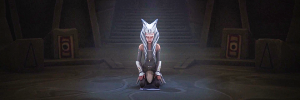#1. What can we make of the fact that the wailing worshipper prefers the shapeless stone Ungit to the cut-Greek Ungit?
#2. When Orual tries to kill herself by casting herself into the river, a god speaks and tells her not to do it. He tells her that she cannot escape Ungit by dieing, and: "Die before you die." What does he mean by this? Are there any parallels we can draw to this in our own lives as Christians?
#3. My face was the face of Ungit as I had seen it that day... I was that Batta-thing, that all-devouring womblike, yet barren, thing. Glome was a web—I the swollen spider, squat at its center, gorged with men's stolen lives.
'I will not be Ungit,' said I."
What do you think of this revelation? Orual has reviled Ungit all her life — how did she become like the goddess? And how can she stop now?
#4. "Who is Ungit?" This question is poised thrice throughout this chapter. Why is it important? How would you answer it?

1. The old shapeless Ungit is what they are used to. But she would also seem to be more 'real', more authentic. The painted idol was just trying to make Ungit prettier and nicer, the stone is how she really is. Neither of them are true, but the old stone is closer to the truth, so it satisfies people more.
2. I think he means that all her old, selfish, sinful self has to die. Rather like when we become Christians, our old 'natural' self that only wants things for us must die, so that Christ may live in us. And later, our desires and wishes often have to 'die' so to speak, before God's can become complete in us.
3. I always thought this was rather strange. But I can see the parallels. Orual loved with a suffocating and possessive love that, in some ways, 'devoured' its object, like Ungit was said to do. I'm not sure how she could stop, except perhaps by giving in, 'dying before she dies', letting the gods change her.
4. I think it is important because of what we have seen what she thinks of Ungit 'a devouring, spider-like thing'. It is what she has held the grudge against the gods for. And now, its like the gods are showing her the same things in herself. Its like they were saying "You have called Ungit selfish, devouring, and possessive. But now see how selfish, devouring, and possessive you are. In those respects, you are Ungit." I would say that, in Glome, not only is there a real Ungit, but all who love as Ungit loves, are in that sense, Ungit themselves.
The glory of God is man fully alive--St. Iraneus
Salvation is a fire in the midnight of the soul-Switchfoot
1. Like Lady Haleth said, the stone was familiar. To her, the stone is Ungit. She also says something about the Greek Ungit being only for the nobles. Also, the Greek Ungit was made by men, but the stone Ungit was said to have come out of the Earth, men didn't create it.
2. All of Orual's possessiveness, prejudice, and jealousy must die. She has to spiritually die before she physically dies. If she physically dies first she can't be saved.
when we become Christians, our old 'natural' self that only wants things for us must die, so that Christ may live in us. And later, our desires and wishes often have to 'die' so to speak, before God's can become complete in us.
Thank you. You explained it much better than I ever could. I agree, our old, sinful selves must die before Christ can live in us.
3. Orual has become possessive, selfish, jealous--everything she despised in Ungit. Now that she has realized what her true self looks like, she can make an effort to stop, but she can't change on her own.
4. I think it's important because it's the key to Orual's realization. All her life she has blamed Ungit for everything bad that happened. Now she realizes that she brought a lot of it upon herself and that she in turn became what she despised in her actions towards others.
all who love as Ungit loves, are in that sense, Ungit themselves.
Very true. Orual is Ungit because she loves like Ungit.
#1. What can we make of the fact that the wailing worshipper prefers the shapeless stone Ungit to the cut-Greek Ungit?
It makes sense in a way. That is what they are used to and no one asked them if they wanted a new and improved Ungit. The new Priest seems to hold a more abstract view of the gods and the new statue reflects that. (If that makes any sense, since the new statue is actually less abstract than the new one). What I’m trying to say is the priest sees the stories as having different meanings than the obvious one. (for example his explanation of the god of the mountain in connection to rain and Ungit). The peasants take the stories literally and don’t see the need to make the images more pleasant.
#2. When Orual tries to kill herself by casting herself into the river, a god speaks and tells her not to do it. He tells her that she cannot escape Ungit by dieing, and: "Die before you die." What does he mean by this? Are there any parallels we can draw to this in our own lives as Christians?
I’m assuming she has to die to her sinful nature or at least to her devouring tendencies. The idea of dying to before you die is a strong idea in Christianity. We have to die to sin and we are baptized into Christ’s death.
#3. My face was the face of Ungit as I had seen it that day... I was that Batta-thing, that all-devouring womblike, yet barren, thing. Glome was a web—I the swollen spider, squat at its center, gorged with men's stolen lives.
'I will not be Ungit,' said I."
What do you think of this revelation? Orual has reviled Ungit all her life — how did she become like the goddess? And how can she stop now?
She is very like the goddess. She manipulates people to get them to do what she wants. Sometimes the things that bother us the most about others are things that we do ourselves. I imagine it is the same for Orual (on one level) and also people have the tendency to see the sliver in someone else’s eye and miss the log in their own.
#4. "Who is Ungit?" This question is poised thrice throughout this chapter. Why is it important? How would you answer it?
To be completely honest, I’m not exactly sure. I would describe her as a devouring creature yet she is also compared to the womb which doesn’t devour. I would describe her as cruel and heartless, caring nothing for others, except the worshiper finds comfort from her. Then I get rather confused by the idea that Orual is Ungit. I don’t know if that means she is like Ungit or if it is to be taken literally or if it is along the lines of the Foxes idea about the god within. I think it is important because Ungit has been an important part of Orual’s life or at least an influence on it. Well, maybe not Ungit herself but rather the fear of Ungit and Orual’s idea of who Ungit is.

NW sister to Movie Aristotle & daughter of the King

